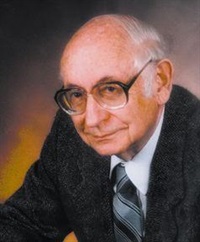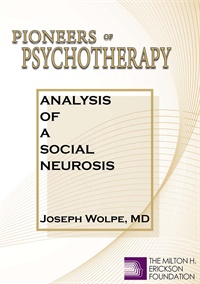Joseph Wolpe, MD - Analysis of a Social Neurosis
- Average Rating:
- Not yet rated
- Topic Areas:
- Clinical Demonstrations | Psychotherapy | Trauma | Aging and Mortality
- Bundle(s):
- Pioneers of Psychotherapy Bundle
- Categories:
- Pioneers of Psychotherapy | Evolution of Psychotherapy | Evolution of Psychotherapy 1990
- Faculty:
- Joseph Wolpe, M.D.
- Course Levels:
- Master Degree or Higher in Health-Related Field
- Duration:
- 00:56:00
- Format:
- Audio and Video
- Original Program Date:
- Dec 14, 1990
- License:
- Never Expires.
Description
Description:
Joseph Wolpe (1990) interviews police officer Tom, who has problems resulting from a traumatic event: he had been confronted by a violent man whom he shot and killed. Later it became evident that the man had an empty gun and was mentally ill. Following a thorough interview, Wolpe uses eye movement and systematic desensitization to diminish the established fear hierarchy.
From conference EP90-CP17-DVD
Educational Objectives:
- To learn the technique of behavioral data-gathering.
- To understand how data is analyzed to reveal case dynamics and pointers to treatment.
*Sessions may be edited for content and to preserve confidentiality*
Credits
Handouts
| Joseph Wolpe Analysis of a Social Neurosis Transcript (160.5 KB) | Available after Purchase | ||
Faculty

Joseph Wolpe, M.D. Related Seminars and Products
Joseph Wolpe, MD, was a South African psychiatrist, one of the most influential figures in Behavior Therapy. Wolpe grew up in South Africa, attending Parktown Boys' High School. Joseph received his M.D. in 1948 from the University of Whitatersrand in Johannesburg, South Africa. He was Emeritus Professor fo Psychiatry and Former Director of Behavior Therapy Unity at Temple University Medical School. He was Professor of Psychiatry at the Medical College of Pennsylvania. One of the leading practitioners of behavior therapy, he has authored three books and co-edited two, and has more than 200 professional publications. He cofounded the Journal of Behavior Therapy and Experimental Psychiatry. He is receipient of the Distinguished Scientific Award for the Applications of Psychology from the American Psychological Association.


